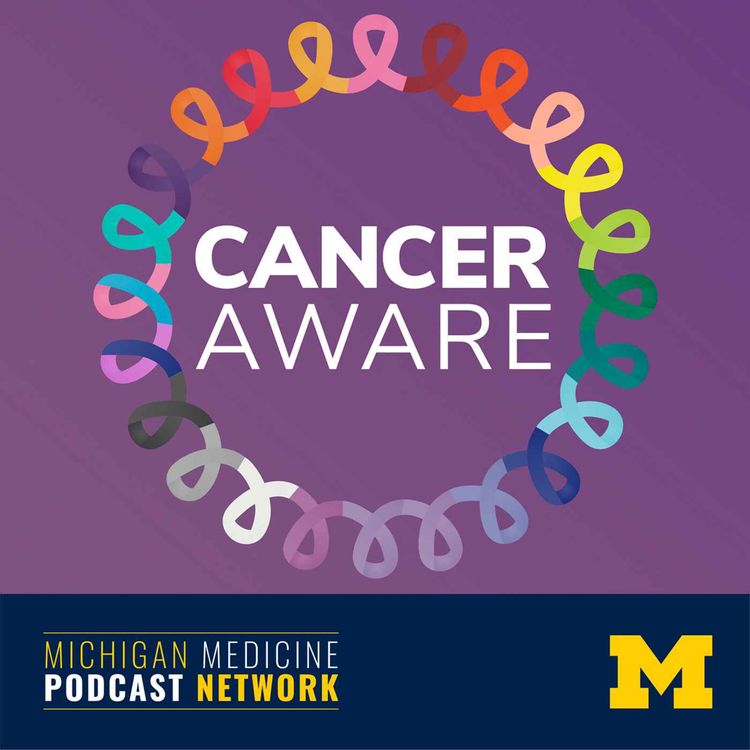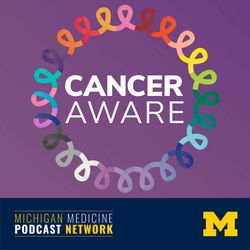Share

Cancer Aware
Music For the Soul
Season 0, Ep. 29
•
The Rogel Cancer Cancer is lucky to have two music therapists an staff for patients to receive this intervention that can help promote relaxation, manage pain, improve quality of life among other benefits. Bob Huffman, has been a music therapist at Michigan Medicine for over 15 years. He explains what music therapy is and how it benefits not only patients, but caregivers and staff. The program is a free and is part of the Patient and Family Support Services Program.
More episodes
View all episodes

62. Understanding Prostate Biopsy
23:03||Ep. 62Those with an elevated prostate-specific antigen test are referred for a biopsy of their prostate to help diagnose prostate cancer or other prostate concerns. This can bring anxiety and discomfort for the patient. Dr. Chad Ellimoottil, a urologist and division chief of men’s health and reconstruction at Michigan Medicine, shares information on prostate biopsies. He discusses those who need it, forms of biopsy, and the latest in performing them.For more episodes, visit the Cancer Aware podcast website.A transcript of this episode can be found here.ParticipantChad Ellimoottil, MDAdditional ResourcesProstate-specific antigen testProstate cancerCancer Aware is a part of the Michigan Medicine Podcast Network and is produced by the Michigan Medicine Department of Communication. You can listen to Cancer Aware wherever you get your podcasts.
61. Focal Therapy for Prostate Cancer
19:26||Ep. 61When treating for localized prostate cancer, surgery and radiation are usually what people hear about. However, there are other treatments that could be options under a heading of focal therapy.Dr. Andrew Wood, a urologic oncologist with the University of Michigan Health Rogel Cancer Center’s Weiser Center for Prostate Cancer talks about these options and which patients could benefit from them.ParticipantAndrew Wood, MDYou can learn more about Cancer Aware on our website.A transcript of this episode can be found here.Cancer Aware is a part of the Michigan Medicine Podcast Network and is produced by the Michigan Medicine Department of Communication. You can subscribe to Cancer Aware on Apple Podcasts, Spotify, or wherever you listen to podcasts.
60. University of Michigan’s Impact on the Future of Cancer Care
36:20||Ep. 60Four University of Michigan faculty members have served as president of the American Society of Clinical Oncology, a rare distinction that only two other institutions can claim. ASCO is the world's leading professional organization for physicians and oncology professionals caring for people with cancer.In this episode, Nicole Fawcett, director of communications for the Rogel Cancer Center, sat down with four past ASCO Presidents and talked about the importance of the society, the impact it has had on cancer care and research as a whole and the impact here at U-M.Participants:Allen Lichter, MD, FASTRODoug Blayney, MDDan Hayes, MDLori Pierce, MD You can learn more about Cancer Aware on our website. A transcript of this episode can be found here. Cancer Aware is a part of the Michigan Medicine Podcast Network and is produced by the Michigan Medicine Department of Communication. You can subscribe to Cancer Aware on Apple Podcasts, Spotify, or wherever you listen to podcasts.
59. How De-Implementation Can Improve Health Care in the U.S.
30:10||Ep. 59In the United States, unnecessary tests and treatments not only drive-up health care costs but may also contribute to a waste of valuable resources and avoidable patient harms. Today we talk with Michigan Medicine assistant professor of surgery Dr. Lesly Dossett, M.D., MPH about an effort to reduce such practices through a process called de-implementation.You can learn more about Dr. Dossett here.You can learn more about Cancer Aware on our website.A transcript of this episode can be found here.Cancer Aware is a part of the Michigan Medicine Podcast Network and is produced by the Michigan Medicine Department of Communication. You can subscribe to Cancer Aware on Apple Podcasts, Spotify, or wherever you listen to podcasts.
58. Pets and Cancer Patient Outcomes in the LGBT Community
42:31||Ep. 58In recent years, researchers have been studying the relationship between pets and overall cancer patient health outcomes. Today we talk with University of Michigan investigators Dr. Nina Francis-Levin, Ph.D., MSW, and Dr. Jess Francis-Levin, Ph.D. who are taking a closer look at this relationship within in the LBGT community.You can learn more about Dr. Nina Francis-Levin here.You can learn more about Dr. Jess Francis-Levin here.You can learn more about Cancer Aware on our website.A transcript of this episode can be found here.Cancer Aware is a part of the Michigan Medicine Podcast Network, and is produced by the Michigan Medicine Department of Communication. You can subscribe to Cancer Aware on Apple Podcasts, Google Podcasts, Stitcher or wherever you listen to podcasts.
57. Palliative Care vs Hospice Care
26:55||Ep. 57On this episode of Cancer Aware, we are talking with Maria Silveira who is a palliative care specialist at Michigan Medicine and the Ann Arbor Veterans Affairs. She has over 20 years of experience working in the hospital and in clinic, taking care of patients with serious illness, supporting them and their families through what is often the toughest time of their lives. She helps train the next generation of palliative care and hospice physicians and nurse practitioners, and she does research in symptom management.You can learn more about Dr. Silveira here. You can learn more about Cancer Aware on our website.A transcript of this episode can be found here.Cancer Aware is a part of the Michigan Medicine Podcast Network, and is produced by the Michigan Medicine Department of Communication. You can subscribe to Cancer Aware on Apple Podcasts, Google Podcasts, Stitcher or wherever you listen to podcasts.
56. Patient Financial Toxicity
26:14||Ep. 56It’s estimated that one in three Americans experience medical cost distress, and many fear the high cost of debt will leave them financially destitute. As a result, many may decline needed treatments or therapies.Here to address this issue is Dr. Mark Fendrick, Professor of Internal Medicine and Professor of Health Management and Policy in the U-M School of Public Health.Dr. Fendrick directs the Value-Based Insurance Design Center at the University of Michigan and his research focuses on how clinician payment and consumer engagement initiatives impact access to care, quality of care, and health care costs.The transcript can be found here.Cancer Aware is a part of the Michigan Medicine Podcast Network. You can subscribe to the Cancer Wise podcast on Apple Podcasts, Google Podcasts, Stitcher or wherever you listen to podcasts.
55. Family Health History as Cancer Prevention
29:54||Ep. 55Drs. Elena Stoffel and Jennifer Griggs, co-principal investigators of the Michigan Genetic Hereditary Testing (MiGHT) Study, discuss the importance of knowing your family health history.Additional resources:MiGHT Study Family History ToolRogel Cancer Center GeneticsGenetic Testing For Inherited Risk For CancerThe transcript can be found here.Cancer Aware is a part of the Michigan Medicine Podcast Network. You can subscribe to the Cancer Wise podcast on Apple Podcasts, Google Podcasts, Stitcher or wherever you listen to podcasts.
54. Metastatic Spine Cancer
22:29||Ep. 54Michigan Medicine neurosurgeon, Nicholas Szerlip, discusses cancer metastasis to the spine and how the Rogel Cancer Center is addressing this through their Metastatic Spine Oncology clinic.The transcript can be found here.Cancer Wise is a part of the Michigan Medicine Podcast Network. You can subscribe to the Cancer Wise podcast on Apple Podcasts, Google Podcasts, Stitcher or wherever you listen to podcasts.